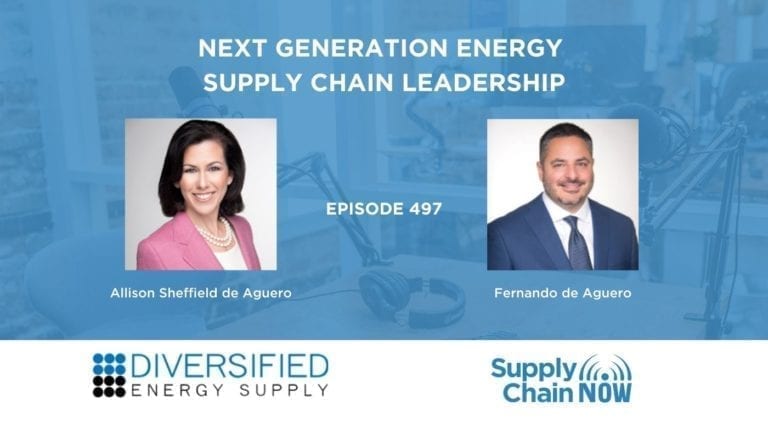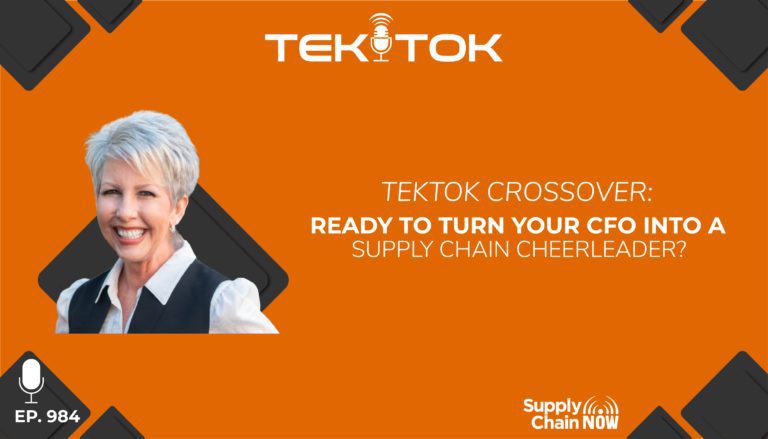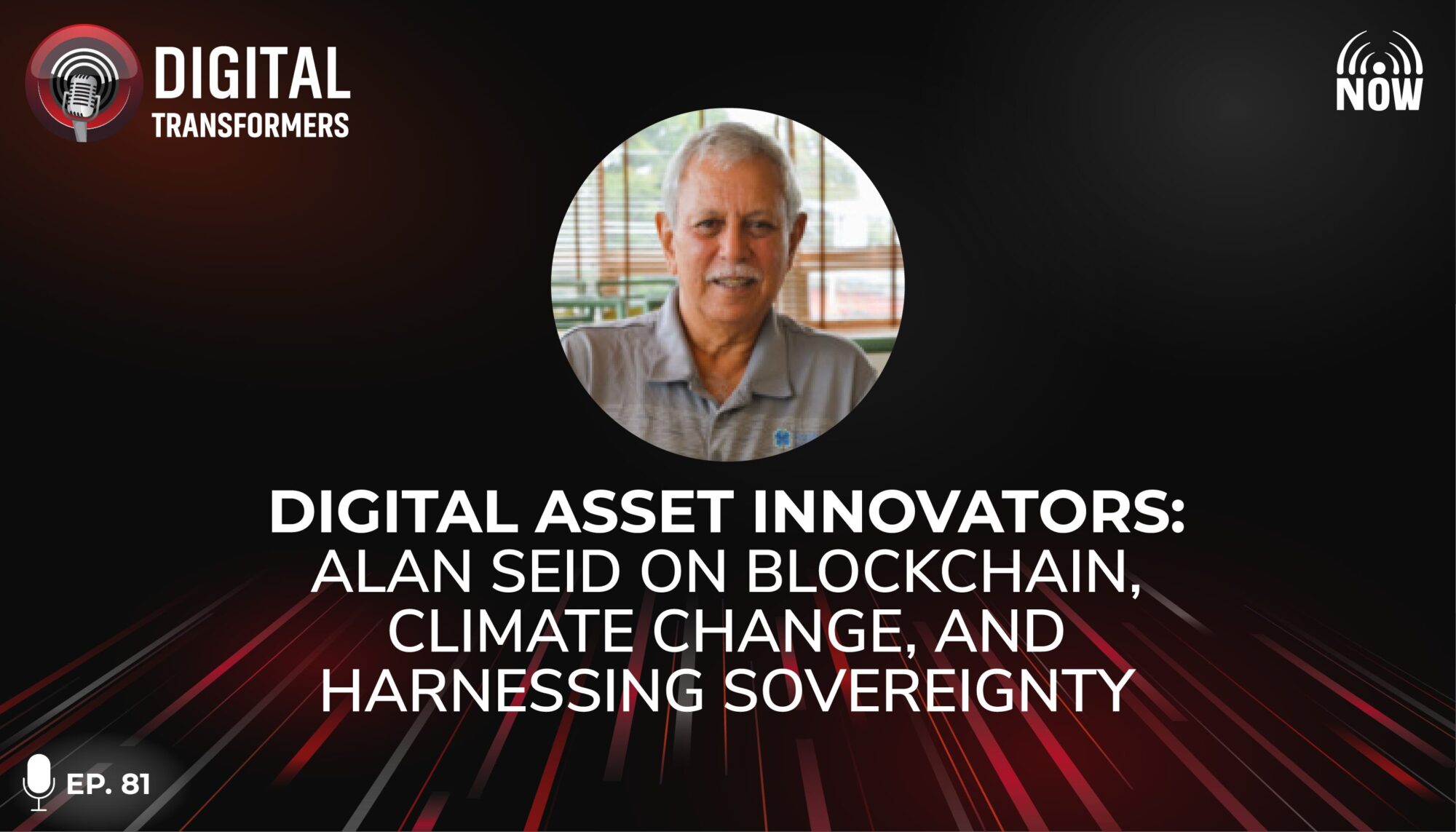Intro/Outro (00:01):
Welcome to Digital Transformers, the show that connects you with what you need to build, manage, and operate your digital supply chain. Join your host in a timely discussion on new and future business models with industry leading executives. The show will reveal global customer expectations, real world deployment challenges, and the value of advanced business technologies, like artificial intelligence, blockchain, and robotic process engineering. And now we bring you Digital Transformers.
Kevin L. Jackson (00:35):
Hello everyone. My name is Kevin L. Jackson. And I’m bringing you the most recent episode of Digital Asset Innovators sponsored by the National DigiFoundry. We highlight the organizations and individuals that are innovating across the digital asset ecosystem. Today, I’m with Alan Seid, a Digital Asset Visionary. Hello, Alan. Thanks for joining me today.
Alan Seid (01:04):
Good morning. Good morning. Good to see you, Kevin. Thank you for having me.
Kevin L. Jackson (01:08):
Oh, no. It’s great to have you here. So, Digital Asset Visionary, and you’re from Palau. How do you put those things together?
Alan Seid (01:17):
Well, you know, I guess it’s the value of Palau as an island is always viewed as this great ocean state, marine resources, reefs, forest and jungles, and indigenous culture. But really one of the most underutilized value or asset of Palau is sovereignty.
Kevin L. Jackson (01:43):
Yes.
Alan Seid (01:43):
Sovereignty. How do you use the sovereignty of a small nation to be at par with larger nations? And so, it’s this love of the value of sovereignty that has led me to blockchain, to digital assets. And how do we translate this sovereignty and technology to do good in the area of environmental protection —
Kevin L. Jackson (02:11):
OK.
Alan Seid (02:12):
— economic growth, and education? So, it’s just my teaching as a young man, don’t just fish in the lagoons, go beyond the reef. And that’s why I’m here with you.
Kevin L. Jackson (02:24):
Oh, no. I like that idea of going beyond the reef.
Alan Seid (02:27):
The reef, yes.
Kevin L. Jackson (02:28):
And — but that’s a lot of responsibility. The independence of a nation being able to take care of their entire population and take on the responsibility of protecting the earth. But I mean, you are threatened with climate change. No matter what people may say, it’s something that threatens your livelihood.
Alan Seid (02:51):
Well, we see it — Kevin, we see it on our daily livelihood. At first, when the climate change issue, when the rising tide was brought up on conversation news media, as a young boy growing up in the lagoons, I said to myself, that’s not possible. Nature doesn’t change. The high tide and the low tides have always been the same all my life.
Kevin L. Jackson (03:16):
Right, right.
Alan Seid (03:17):
How can these people say the tide will be higher than when I was 10 years old? Now, I couldn’t believe it because I just felt that the power of the nature hasn’t changed for hundreds of years. Why should it change —
Kevin L. Jackson (03:30):
Yes, why shouldn’t change now?
Alan Seid (03:31):
But I started seeing the chains, visually seeing the chains and seeing the impact. And I said, oh my, God. All these things about climate change and what the scientists are saying, the carbon pollution to the planet, they are really having an effect.
Alan Seid (03:48):
And it started affecting our livelihood. Our tarot patches were on the low rise — low islands. You know, the salt water start coming in and destroying the crops. Tarot is our main staple and our cultural food. And then you started seeing the coral bleaching and it turned white. And people said, oh, very colorful. But it was a sign of dying corals from the rising temperature.
Alan Seid (04:17):
So, as a person who loves the ocean, I started saying to myself, if I could take some responsibility as one person to educate people and to share our issues with the world, the more of us doing it, the easier it will become to achieve some objectives.
Alan Seid (04:39):
And I really have to say the knowledge of this climate change issues have really become much more widespread than before. Now, the next step, Kevin and to everyone, what steps do we take to remedy the problem? And what steps do we take using technology, digital assets, blockchain that can really translate the asset classification, translate the actual measurement of how it’s done? And not only become successful scientifically, but how can we make it successful to the point that it affects the lives of the people of the island of Palau and all of the islands of the Pacific? And that’s the key question.
Kevin L. Jackson (05:31):
But this is really an innovative way to look at protecting the earth and linking that to digital assets. What was that vision? I mean, how do you think digital assets could help when it comes to the independence of a nation?
Alan Seid (05:50):
Well, you know, yesterday I gave that small speech at our conference.
Kevin L. Jackson (05:54):
Yes.
Alan Seid (05:55):
And I talked about the Yapese stone money, it’s called rai. And also, the Palauans, we have our own stone money. I think you saw the yellow bead on my wife’s neck.
Kevin L. Jackson (06:04):
Right.
Alan Seid (06:05):
That is our traditional stone money. And all of these stone money have value that are passed on from generations to generation and perform wedding deeds, funeral deeds. And — but the value is in the knowledge of where that money came from, how it was brought to the families, and et cetera.
Alan Seid (06:26):
So, I jokingly said, you know, you guys talk about blockchain and Ethereum and Bitcoin, but we, the people of Palau and the people of the Yap islands, we were way ahead of you. We had blockchain long before —
Kevin L. Jackson (06:39):
The original blockchain.
Alan Seid (06:40):
The original blockchain. And so, I just said, listen, you know, rather than writing e-mails and proposals. And rather than have documents stuck some office at the museum or something, why don’t we put all of these things in the blockchain so that visibility is there, accountability is there. But the education is accessible to a lot of people.
Alan Seid (07:08):
And because technology has come to the islands in the form of fiber optic cable, satellites, we now have access to information. And information is power. So, if we can put our reefs, our jungles, our mangrove forest, our issues with the rising tide, eroding beaches, frequent storms. If we can document all of these things and put them on the blockchain so there is visibility, accountability, then it becomes easier for larger countries and people and companies that care to be able to find ways to support.
Alan Seid (07:50):
Because, as a matter of fact, I don’t want to put up a blame game with anybody. But we, the island of Palau and Micronesia and the Marshall Islands and the many islands in the Pacific, are all victims of actions that have been taken for a hundred years by bigger countries. And you know —
Kevin L. Jackson (08:10):
Yes, the industrial countries.
Alan Seid (08:12):
The industrial revolution. And, you know, we have the United States, my friends from Japan, we have China, and they continue to release all these carbon into the environment.
Kevin L. Jackson (08:24):
Right, right.
Alan Seid (08:25):
If we don’t wake up as a people of the Earth and the temperature will rise and rise, we are going to be in greater trouble. And that is why the voice of the island people is so important because it’s the voice of the people that are the most vulnerable. Is that the right word?
Kevin L. Jackson (08:50):
Yes, vulnerable.
Alan Seid (08:51):
Vulnerable to the issue of climate change and rising tide. I just want to add, Kevin, because I get a little emotional about this.
Kevin L. Jackson (08:58):
No, this is important.
Alan Seid (09:00):
When you kill a coral because the temperature went up, you didn’t just kill a coral, you killed an ecosystem because that coral was home to small fish, to small shrimps, to clams, to — that are connected to this larger fish and on and on. So, it’s all very connected.
Alan Seid (09:24):
And so, I say the blockchain, the technology, the digitization of these assets is a really important way to preserve these assets, but at the same time provide solutions. And that’s the quest we’re on. That’s the DigiFoundry forum. How do we combine all these wealth of knowledge and technology from all the people that have joined this foundation? How do we put them all to work?
Alan Seid (09:57):
And it’s not a question of money. There’s money here and there and everywhere. It’s a question of will. Do we want to make it happen for the islands and the communities of the Pacific and other island communities? So —
Kevin L. Jackson (10:15):
This is —
Alan Seid (10:15):
— I’ll just kind of pause for a moment there because I — you may have other questions. But I’m really hoping and praying that this is — this issue of climate change is not going to be politicized. It’s not going to be debated that the whole leadership of the world come together and say, we have to save our planet and we have to save the islands from further eroding.
Alan Seid (10:46):
There’s been words saying, sinking, you know, rising tides coming in. You know, there are even more low-lying islands that, you know, the storm comes in and just wipes them out. Some islands have even disappeared.
Alan Seid (11:00):
So, in addition to the climate change issue, I just want to add, Kevin, because we have a really big problem in the Pacific with plastic waste. And not only are we being hammered by more typhoons, warmer oceans that are killing our corals — coral reefs, and rising tide that are destroying our crops. We are also getting hammered by loads of plastic trash that are floating from bigger countries to our islands and invading our beaches. Taking away the space for the turtles to lay their eggs. And yet we use plastics every single day.
Kevin L. Jackson (11:40):
Yes.
Alan Seid (11:40):
So, how do we wake up to the fact that what we’re doing needs to be changed? What we’re doing needs to be improved? And it really doesn’t just begin by government making this policy. It begins with the individual person. I’m not going to use that plastic because I don’t want to contribute to that issue. So, I just wanted to mix that issue. And I’m hoping that there’s a way that technology and digital assets can also capture mythology [phonetic] to clean up the oceans.
Kevin L. Jackson (12:16):
No, thank you. This is — I mean, this is one reason why we at the National DigiFoundry is so happy and proud to be partnering with you and all of the Pacific Island nations. So, as we close, what is the value of the NDF to you? How does your membership support your quest to save the planet?
Alan Seid (12:40):
Well, you know, I think what you’ve done, Kevin, by putting together some of the most incredible resources, National Science Foundation, a U.S. Treasury Department, IBM, Digital — I mean Constellation Networks —
Kevin L. Jackson (12:57):
Yes, Constellation Networks.
Alan Seid (12:57):
— and Blockchain Academy, which I really admire in teaching people. If we bring all this together, then I see my role as bringing the islands to combine with all these resources. I will speak to our leaders of the Micronesia, the Commonwealth of the Mariana Islands, Guam, Marshall Islands, because the more cohesive support we have, the better chance we succeed. And it begins with education.
Alan Seid (13:31):
You know, working with the schools to educate the value of technology and blockchain and how it can be used to educate people about the climate issues, and how to educate donors to support, and how possibly we could — on the blockchain make individual persons or corporations take part in the quest to regrow corals, for example. To replenish the reefs or to preserve the mangrove forest. So, for me, Kevin, I am truly honored to be part of our organization and I’m at your disposal. And I’m hoping that in a small way I can be of some help.
Kevin L. Jackson (14:20):
Well, Alan, thank you very much. You are inspiring. And that ends our episode of The Digital Asset Innovators. Please visit us at digifoundry.org.
Intro/Outro (14:35):
Thank you for supporting Digital Transformers and for being a part of our global Supply Chain Now community. Please check out all of our programming at supplychainnow.com. Make sure you subscribe to Digital Transformers anywhere you listen to or view the show. And follow us on Facebook, LinkedIn, Twitter, and Instagram. See you next time on Digital Transformers.



















































